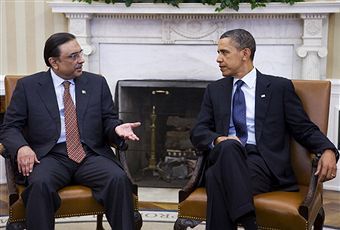 The US-Pakistani relationship has always been fraught, but it is particularly fractious
right now. It is highly likely that the US will conduct more Abbottabad-type raids following the killing of Osama Bin Laden. According to sources in the US government, several locations were under
surveillance alongside Bin Laden’s compound. And that was before the CIA snatched the “motherlode” of information from the Bin Laden raid, which will give hundreds of new leads. People
like Ayman al Zawahiri, Abu Yahya al Libi, and Saif al Adel will be sleeping a little less soundly these days.
The US-Pakistani relationship has always been fraught, but it is particularly fractious
right now. It is highly likely that the US will conduct more Abbottabad-type raids following the killing of Osama Bin Laden. According to sources in the US government, several locations were under
surveillance alongside Bin Laden’s compound. And that was before the CIA snatched the “motherlode” of information from the Bin Laden raid, which will give hundreds of new leads. People
like Ayman al Zawahiri, Abu Yahya al Libi, and Saif al Adel will be sleeping a little less soundly these days.
Regrettably, the Pakistani government has done little to prepare its population for the likelihood of new raids, preferring to blow off steam over the US violation of Pakistani sovereignty. Last week, the Pakistani legislature fulminated against the US. The issue of who knew the whereabouts of bin Laden has been given a lot less attention. But the ISI has been making matters even worse, outing the CIA station chief (for the second time) and saying they will give the downed SEAL helicopter to the Chinese.
None of this will make the US refrain from taking action against Al Qaeda. It will not create an equal relationship, as the ISI so desperately want. It will only make the US trust Pakistan even less. The result: when the raids come, another even bigger confrontation will ensue. What to do? President Asif Ali Zardari, though he may be weak, must be helped to sack lSI chief Ahmed Shuja Pasha, replace him with a non-political civilian and instigate a reform of the security services. In this, Britain should lean on opposition leader Nawaz Sharif to support the move; for example, by making clear that if he wants to come to Britain for future medical treatment he will need to back change. At the same time, the international community should make clear to Pakistan military leadership that a coup would be unacceptable.
To make the reforms more politically palatable, President Zadari should also establish a commission to examine the US-Pakistani relationship and report to him and publicly. It could be co-chaired by Pakistani UN diplomats, Iqbal Riza and Ashraf Jehangir Qazi.
This may all be deemed “too difficult”. But unless the US-Pakistani relationship is to deteriorate further, to everyone’s disadvantage, dramatic change must take place inside Pakistan’s security establishment.






Comments